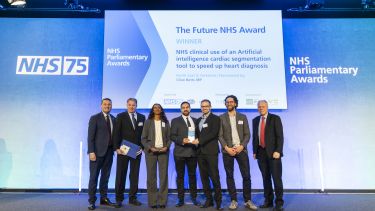- Innovative tool developed by scientists and clinicians from the University of Sheffield’s Insigneo Institute and Sheffield Teaching Hospitals provides a super-fast analysis of the heart’s function, spotting heart damage on MRI heart scans in seconds
- The technology can also monitor changes in pressure that place over the course of the cardiac cycle, giving more detailed analysis critical to understanding how blood flows in and out of the heart.
- The AI tool was named the overall winner in the national NHS Parliamentary Awards, which celebrate the work of NHS staff who have gone above and beyond in their field
An artificial intelligence cardiac diagnostic tool which is speeding up heart function assessments and reducing MRI scan reporting time for NHS heart patients has won The Future NHS Award at the prestigious NHS Parliamentary Awards ceremony.
The innovative tool, which was developed by scientists and clinicians from the University of Sheffield’s Insigneo Institute and Sheffield Teaching Hospitals, provides a super-fast analysis of the heart’s function, spotting heart damage on MRI heart scans in seconds.
The tool was named the overall winner in the national NHS Parliamentary Awards, which celebrate the work of NHS staff who have gone above and beyond in their field. The Awards, which were attended by Members of Parliament from across the political spectrum, were held yesterday to commemorate the health services’ 75th birthday.
The Sheffield team’s work was nominated by Sheffield MP Clive Betts.
Kirsten Major, Chief Executive, Sheffield Teaching Hospitals NHS Foundation Trust, said: “We are honoured and hugely proud to have received this award on the NHS’ 75th birthday. Here in Sheffield we have a long history of embracing innovation to improve patients’ lives, and the dedication and compassion of our staff has been a constant theme.
“The innovative use of AI to help diagnose heart problems is a fantastic example of the transformative skill of the team who developed it and is already enabling clinicians to speed up heart disease diagnosis. We are exceptionally proud of the teams both within Sheffield Teaching Hospitals and the University of Sheffield who have worked so hard to bring this technology to the NHS. This is extremely deserving recognition and I would like to thank all the teams involved."
Professor Koen Lamberts, Vice-Chancellor of the University of Sheffield, said: "We are proud of our long-established and successful relationship with Sheffield Teaching Hospitals NHS Trust, which is at the heart of bringing our innovative translational research to patients. This project is already making a difference to patients’ lives across South Yorkshire and beyond. Congratulations to the collaborative team who have pioneered this cutting-edge AI technology.”
Clive Betts MP, Labour MP for Sheffield South East, said: “I was delighted to accept this award on behalf of the team at Sheffield Teaching Hospitals. The innovative use of AI to improve the images which doctors have to help them more accurately diagnose heart problems is already leading to more speedy identification of problems and is therefore reducing waiting times for treatment.”
Richard Barker, Regional Director, North East and Yorkshire, NHS England, said: “I am delighted to see Sheffield Teaching Hospitals NHS Foundation Trust recognised as worthy winners within the Future NHS Award category. The work they have undertaken is outstanding and is already making such a difference to patients. I would like to offer my huge congratulations to the Trust and team behind this fantastic work.”
The AI cardiac diagnostic tool works by automatically segmenting images taken of the complex chambers of the heart to analyse the heart’s function, performing mathematical and volumetric tasks on a staggering series of over 180 images taken from one patient’s MRI scan in seconds. Without the technology, these tasks would need to be performed manually.
The technology can also monitor changes in pressure that place over the course of the cardiac cycle, giving more detailed analysis critical to understanding how blood flows in and out of the heart.



